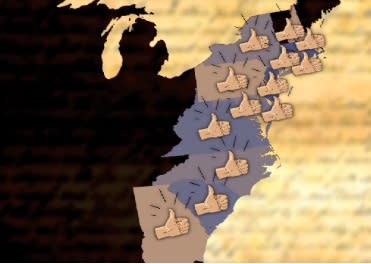Why the U.S. was (sorta) founded on June 21st
If you were to ask people to name the big dates in the history of our founding, most would offer the usual responses. July 4, 1776, would win hands down. A few people might venture April 18, 1775, for Paul Revere’s Ride. Some (we hope many) might go for September 17, 1787, when the Constitution was signed here in Philadelphia.
But how about June 21, 1788? Although it doesn’t immediately spring to mind, that’s a pretty significant date in American history. It was then that New Hampshire ratified the Constitution, becoming the ninth state to do so and supplying the necessary number to put the Constitution into effect.
Here at the National Constitution Center, we commemorate all of the important mile-posts on our constitutional journey.
The ratification process is easy to take for granted; people often read about the intense debates at the Convention and assume that the document activated itself when it was signed. In fact, the ratification conventions were equally heated, and in some states like Virginia and New York, the document’s supporters only succeeded by a narrow margin.
New Hampshire’s ratification was also interesting because the ratifying convention chose to include a list of proposed changes to the new Constitution. Several other states submitted similar suggestions.
Ten of these changes would ultimately become the first 10 amendments to the Constitution – the Bill of Rights we all know and love. And so, as New Hampshire’s ratification brought the Constitution’s intervening period between signature and enactment to a close, it also helped to usher in the first set of changes to the document itself.
To help people learn more about the process of ratification, we went to New Hampshire in 2011 to film parts of an episode of Constitution Hall Pass, our web-based video lesson series. The episode looked at the road to ratification and examined how the Constitution guarantees our freedom of expression.
Click here to watch the entire episode.
Mark Kehres is the Museum Programs and Training Manager at the National Constitution Center. He is the writer of Constitution Hall Pass.


